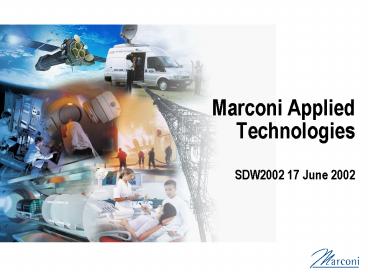Marconi Applied Technologies - PowerPoint PPT Presentation
1 / 28
Title:
Marconi Applied Technologies
Description:
Paul R Jorden, Peter Pool Marconi Applied Technologies. Simon M Tulloch ... XMM-Newton Epic CCD22 SXI CCD64. 600 *600 FT, 40 um, open pixels 512*580, 16 um ... – PowerPoint PPT presentation
Number of Views:208
Avg rating:3.0/5.0
Title: Marconi Applied Technologies
1
Marconi Applied Technologies
- SDW2002 17 June 2002
2
Secrets of Marconi CCDs
- Paul R Jorden, Peter Pool Marconi Applied
Technologies - Simon M Tulloch Isaac Newton Group
- Scientific Detectors for Astronomy workshop
- June 16-22, 2002
- Waimea, Hawaii
3
Outline of talk
- Specialised performance characteristics
- L3Vision update
- Novel CCD types
4
Specialised performance characteristics
- Dither clocking dark current
- High resistivity silicon CCD performance
- QE
- Fringes
5
Dither-1
- Modulation of clocks can suppress surface dark
current, with a characteristic time constant. - dynamic dark current suppression
- Can be seen as a variation of dark current rate
with exposure time
6
Dither-2
- The rate at short times represents bulk DC
- The rate at long times represents surface DC
- These rates can be determined from short and long
exposures, at various temperatures.
7
Dither-3
- The time constant varies with temperature
8
Dither-4
- Summary
- clocks are modulated during the clear cycle prior
to an exposure - dark current rate is 'bulk' or inverted-mode
level, if t ltlt tau - dark current rate is 'surface' or non-inverted
level, if t gtgt tau - tau changes with temperature
- inverted mode dark current is achieved in short
integrations - for long integrations, the rate increases to the
surface dark current level - For surface inversion (of off clocks) Vss is
high (9V, for clock-LO 0V) - the same effect applies if clocks are modulated
during an exposure- dither clocking - Below 80C time constant is longer than 1 hour
9
High resistivity CCD42-90
- Deep depletion CCD QE
- 40 um thick sensor
- -105C measurements
- Model matches measurements
- Mirror on frontside increases red response
- 20C response shown for comparison (model)
10
High resistivity CCD42-90
- Fringing- comparison of std and dd CCD
- Fringe amplitudes ING data
Also FWHM 1.5 pix 20 um (from 650-1000nm)
11
L3Vision update
- L3 vision (avalanche gain CCDs)
- CCD65 FI on sale
- (ceramic Peltier packages)
- CCD60 FI on sale
- (ceramic package, at present)
- CCD65 and CCD60 cameras board sets
- CCD60 BI in development
- CCD87 (512512, 16 um)
- in development, for release soon (FI initially)
- Other formats possible, in discussion
CCD60 (128128, 24 um)
CCD65 (288576)
12
Novel CCD types
5 inch wafers, fibre-optics, dental CCDs, and
others.
13
Examples of Astronomy, Space and custom CCDs
- Ground-based astronomy
- Space astronomy
- Tracking functions
- Etc
- Many of the devices shown have been built under
special contract, and are not commercially
available. - The pictures illustrate the variety of custom
devices packages that can be manufactured.
14
Vertex detectors (SLAC)
- VXD-2 (480 of CCD02-06) VXD-3 (96 of CCD32-60)
- each chip 800 4000, 20 um
15
Ground-based astronomy mosaics
- CCD42-90 (2048 4608, 13.5 um)
- 4-chip mosaic (LBT) 40-chip mosaic (CFHT)
16
Space-1 Package examples (Solar B )
- CCD74 Filtergraph CCD75 Spectropolarimeter
- CCD74 Filtergraph CCD75 Spectropolarimeter
17
Space-2 misc.
- Corot CCD42-80 Frame Transfer Large custom
Peltier-cooled
18
Space-3 CCD42-40 applications
- CCD42-40 (2048 2048, 13.5 um)
- Stereo Rosetta Osiris
19
Fast frame rates, small formats
CCD80 (5050, 12 um) CCD50 (128 128, 24 um, 16
outputs) CCD60 (128 128, 24 um, 1 output)
20
Linear square formats
- CCD21-40 Integral CCD47-20
- 12K linear, 8 um 1024 1024 FT, 13 um
21
X-ray CCDs-1
- XMM-Newton Epic CCD22 SXI CCD64
- 600 600 FT, 40 um, open pixels 512580, 16 um
22
X-ray CCDs-2
- D-CIXS CCD54 1.07 cm2 single pixel
- swept charge
- Jet-X CCD12
23
Envisat (ESA)
- CCD25-20 Meris CCD26-10 Gomos
- 770 1152, 22.5 um 1353142 FT, 20 27 um
- Imaging spectrometer UV ozone monitoring
- (gradient coating)
24
CCD46
- CCD46-62
- 2048 1582, 27 um
- 55 43 mm
25
WFC-1 Hubble WFC3 UVIS (CCD) Detector CCD43-62
(4096 2050, 15 um)
26
WFC-2 CCD43-62 (4096 2050, 15 um)
WFC3 UVIS (CCD) Detector EnclosureIs Derived
From The ACS Design
Enclosure
Hardware from the ACS Wide Field Channel
Focal Plane Assembly - Two 2K x 4K Marconi
CCDs acknowledgements to Ed Cheng, Goddard
Base Plate
Focal Plane
Upper Radiation Shield
27
WFC-3
The Marconi ContributionThe Heart Of The WFC3
UVIS Channel
- 8 flight-quality CCDs, delivered on an extremely
aggressive schedule. - 4 additional flight-quality ACS CCDs used in a
backup ACS enclosure. - 2 pairs of CCDs will be built into a flight and
flight spare enclosure. - Extremely good and stable QE in the 200 to 350 nm
band, and good QE throughout the visible. - Opens up the near-UV window for wide-field
observations while backing up existing imaging
capabilities. - Extremely low readout noise.
- Critical for faint object work.
- Extremely high charge transfer efficiency.
- Critical for good photometric performance.
- The Marconi charge injection feature is likely to
provide a new tool for charge transfer
degradation mitigation. - These devices will carry HST imaging science
through the end of the HST mission.
This detector development program is an
unqualified success! Congratulations and thanks
to the entire Marconi team. acknowledgements to
Ed Cheng, Goddard
28
The end of the show, for today
Were still in business, and busy- Whether its
EEV, Marconi Applied Technologies, or
whatever. With acknowledgements to colleagues
who provided material for this talk































